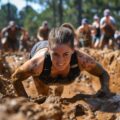Embarking on your first triathlon is more than just a physical challenge—it’s a transformative journey that can boost your confidence, resilience, and overall well-being. This guide will help you prepare for your triathlon with compassion and mindfulness, focusing on personal growth rather than just crossing the finish line.
Understanding the Triathlon: A Celebration of Human Potential
A triathlon combines swimming, cycling, and running into one event. But beyond the physical aspects, it’s a celebration of human potential and determination. As you train, remember that each stroke, pedal, and step is bringing you closer to realizing your capabilities.
- Swimming: An opportunity to connect with water and find your flow
- Cycling: A chance to explore your surroundings and feel the wind on your face
- Running: A test of endurance that builds mental strength
Mindful Training: Listening to Your Body and Soul
Training for a triathlon isn’t about pushing yourself to the brink. It’s about understanding your body, respecting its limits, and gradually building your strength and endurance. Here are some compassionate training tips:
- Start slow and gradually increase your training intensity
- Incorporate rest days to allow for recovery and prevent burnout
- Practice mindfulness during training to stay present and enjoy the journey
- Celebrate small victories along the way
Remember, the goal is not just to finish the race, but to grow as a person through the process.
Nourishing Your Body: Fuel for Body and Soul
Proper nutrition is crucial for triathlon training, but it’s not just about calories and macronutrients. It’s about nourishing your body with wholesome foods that make you feel good. Consider these tips:
- Focus on whole, nutrient-dense foods
- Stay hydrated, but listen to your body’s thirst cues
- Experiment with different foods to find what works best for you
- Practice mindful eating to fully appreciate your meals
Remember, food is fuel, but it’s also a source of pleasure and connection. Enjoy your meals and the energy they provide for your training.
Building a Supportive Community: You’re Not Alone
Training for a triathlon can sometimes feel isolating, but remember that you’re part of a larger community of athletes and enthusiasts. Here’s how you can connect and find support:
- Join a local triathlon club or training group
- Participate in online forums and communities for triathletes
- Share your journey with friends and family
- Consider working with a coach who can provide guidance and encouragement
Remember, every triathlete was once a beginner. Don’t be afraid to ask for help or share your experiences.
Mental Preparation: Cultivating a Positive Mindset
The mental aspect of triathlon training is just as important as the physical. Cultivating a positive mindset can help you overcome challenges and enjoy the process. Try these strategies:
- Practice visualization techniques to boost confidence
- Use positive affirmations during training
- Keep a training journal to track progress and reflect on your journey
- Practice gratitude for your body and its capabilities
Remember, your mindset can be your greatest ally or your biggest obstacle. Choose to approach your training with positivity and compassion.
Race Day: Embracing the Experience
When race day arrives, remember that it’s a celebration of your hard work and dedication. Here are some tips to help you make the most of the experience:
- Arrive early to familiarize yourself with the course and transition areas
- Take deep breaths and use calming techniques if you feel nervous
- Focus on your own race, not on other competitors
- Smile and enjoy the moment—you’ve earned it!
Remember, crossing the finish line is an incredible achievement, but the real victory is in the personal growth you’ve experienced along the way.
FAQ: Your Triathlon Journey
Q: How long should I train for my first triathlon?
A: The duration of training depends on your current fitness level and the distance of the triathlon. Generally, beginners should allow 12-16 weeks of consistent training. Remember, it’s not just about the time spent training, but also about building confidence and enjoying the process.
Q: What if I’m not a strong swimmer?
A: Don’t worry! Many triathletes start with limited swimming experience. Focus on improving your technique through lessons or joining a swim group. Remember, the goal is progress, not perfection. Embrace the challenge as an opportunity for growth.
Q: How do I balance triathlon training with work and family life?
A: Balance is key. Prioritize your training sessions, but don’t let them overshadow other important aspects of your life. Involve your family in your journey, be flexible with your schedule, and remember that quality training is more important than quantity.
Q: What should I eat before and during the race?
A: Stick to foods you’re familiar with and that have worked well during your training. Generally, a meal rich in complex carbohydrates the night before, and a light, easily digestible breakfast on race day works well. During the race, use nutrition that you’ve practiced with during training. Listen to your body and fuel it with kindness.
Q: How do I deal with pre-race nerves?
A: Pre-race nerves are normal and even beneficial! Channel that energy into excitement. Practice deep breathing, visualization, and positive self-talk. Remember why you started this journey and trust in your training. Embrace the nerves as a sign that you’re about to do something amazing!
Embarking on your first triathlon is a courageous step towards personal growth and self-discovery. Remember to approach your training with compassion, celebrate your progress, and enjoy the journey. You’re capable of more than you know. Good luck, and may your first triathlon be the beginning of a beautiful adventure!









